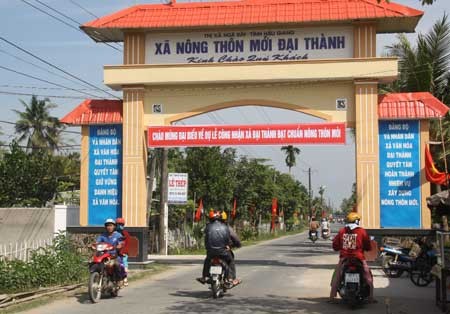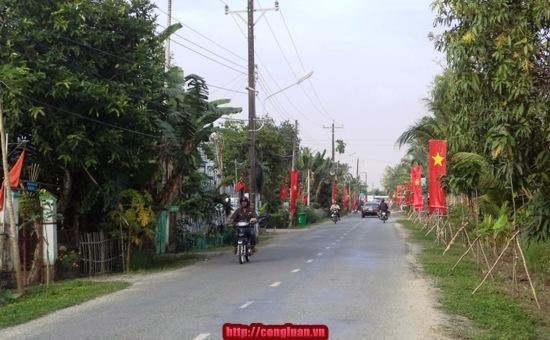(VOVworld) – Vietnam’s new rural development program aims to develop the rural economy, improve people’s living conditions, modernize socio-economic infrastructure in the countryside, and uphold the national cultural identity.
Dai Thanh has long been recognized as a cultural commune, which led to its selection as one of 11 villages to pilot Vietnam’s new rural development program. After 3 years, Dai Thanh led the Mekong River Delta region in fulfilling all 19 criteria of the program.
 |
| Dai Thanh has really prospered thanks to the new rural development program (Photo: cand.com.vn) |
Dai Thanh impresses visitors with its spacious houses, roads, and infrastructure. Cao Thanh Hung, Deputy Chairman of the commune’s People’s Committee, said: “the local have agreed that the spiritual life is indispensable. Both villagers and commune authorities have paid special attention to the improvement of cultural life. The cultural and art exchanges involving Don ca tai tu singing is an indispensable activity.”
Cultural and art activities are regularly organized in line with sharing experiences in doing business. On every 16th day of the lunar month, villagers from Dong An gather at a Don ca tai tu singing club, which is located at the house of the 67-year-old Nguyen Hoang Nhut, also chief of Dong An hamlet’s horticultural club. Nhut said: “I have loved Don ca tai tu singing since I was about 10. First, I only learned to sing. But as I grew up more, I began to learn to play the musical instruments. In the past, I actively participated in art movements. With such a passion, I could learn to become a Tai Tu performer. A real Tai Tu performer should have quintessence.”
 |
| Roads in Dai Thanh communes are now spacious and clean |
Nguyen Van Nhon, an official in charge of Dai Thanh’s culture, said almost all government staff and members of local organizations have registered to attend the class to learn Don ca tai tu singing. Nhon noted: “in Dai Thanh, the commune leaders and villagers have a great passion for this kind of singing but they didn’t have a chance to be professionally trained to exactly understand it. With provincial support, now they can join the training classes as a way to boost Don ca tai tu singing movements at the grassroots level and to be able to teach others.”
Club members, who are between 30 to 70 years old, joined the guild due to their passion, and want to preserve this traditional cultural form. These cultural and art exchanges has enriched the spiritual life of Dai Thanh and connected villagers to the benefits of the new rural development program.